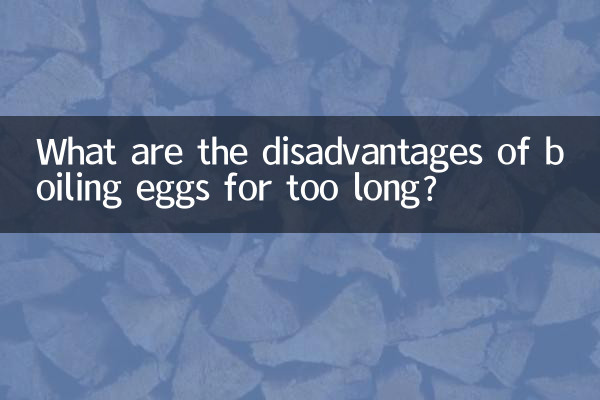What are the disadvantages of boiling eggs for too long?
Eggs are a common ingredient in our daily lives. They are rich in high-quality protein, vitamins and minerals and have extremely high nutritional value. However, improper cooking methods may affect its nutritional value and taste. Recently, there has been a lot of discussion about the harm of boiling eggs for too long. This article will analyze this issue in detail based on the hot topics and hot content on the Internet in the past 10 days.
1. The nutritional impact of boiling eggs for too long

Boiling eggs for too long will cause the loss or denaturation of some nutrients. The following are the main nutrients affected:
| Nutritional information | Effects of cooking for too long |
|---|---|
| protein | Excessive heating can cause protein denaturation and reduce digestion and absorption rates. |
| Vitamin B complex | Heating at high temperature for a long time will destroy water-soluble vitamins such as vitamin B1 and B2. |
| unsaturated fatty acids | High temperature for a long time may oxidize and produce harmful substances |
| Minerals | Some minerals may be lost due to excessive heating |
2. The impact of boiling eggs for too long on the taste
In addition to nutritional losses, eggs that are cooked too long will also suffer from the following taste problems:
| parts | Taste changes |
|---|---|
| protein | Becomes dry, hard and rubbery |
| yolk | A grayish-green color appears on the surface, producing a sulfide odor. |
| overall | Lose the fresh taste and become difficult to swallow |
3. Harmful substances that may be produced by boiling eggs for too long
When eggs are cooked for too long, a layer of gray-green material will appear on the surface of the yolk, which is iron sulfide. This phenomenon occurs due to:
| chemical reaction | Generate conditions | Potential hazards |
|---|---|---|
| protein breakdown | High temperature for a long time | produce hydrogen sulfide |
| Hydrogen sulfide reacts with iron | Egg yolks are high in iron | Formation of iron sulfide |
| fat oxidation | Heating for a long time | May produce free radicals |
4. How to cook eggs correctly
To avoid the above problems, it is recommended to use the following method to boil eggs:
| Egg type | Boiling time | Best condition |
|---|---|---|
| Soft-boiled eggs | 4-5 minutes | The egg white is solidified and the yolk is semi-liquid. |
| Hard boiled eggs | 8-10 minutes | The egg white and yolk are completely solidified |
| Hot spring egg | 65-68℃ 30 minutes | The egg white is semi-solidified and the yolk is liquid. |
5. Remedy for overcooked eggs
If you accidentally overcook your eggs, you can try the following methods to improve them:
1. Immediately put the eggs into cold water to cool down to prevent the residual heat from continuing to heat;
2. Use overcooked eggs to make egg salad, and add mayonnaise and other seasonings to improve the taste;
3. Slice hard-boiled eggs and use them in sandwiches or salads;
4. Mash the egg yolks, add a little water or milk and mix thoroughly to reduce the dryness.
6. Expert advice
Nutritionists recommend that the best time to boil eggs is 8-10 minutes, which can not only ensure that the eggs are fully cooked, but also retain the nutrients to the maximum extent. Also remind everyone:
1. When boiling eggs, the amount of water should be sufficient to ensure that the eggs are completely submerged;
2. Add the eggs after the water boils, instead of adding cold water to the pot;
3. Rinse with cold water immediately after cooking to facilitate shelling;
4. It is best to boil the eggs and eat them immediately. Do not store them for a long time.
Through the above analysis, we can conclude that cooking eggs for too long will not only affect the taste and appearance, but also lead to the loss of nutrients and may even produce harmful substances. Only by mastering the correct method of boiling eggs can you fully enjoy the nutrition and deliciousness of eggs.

check the details

check the details